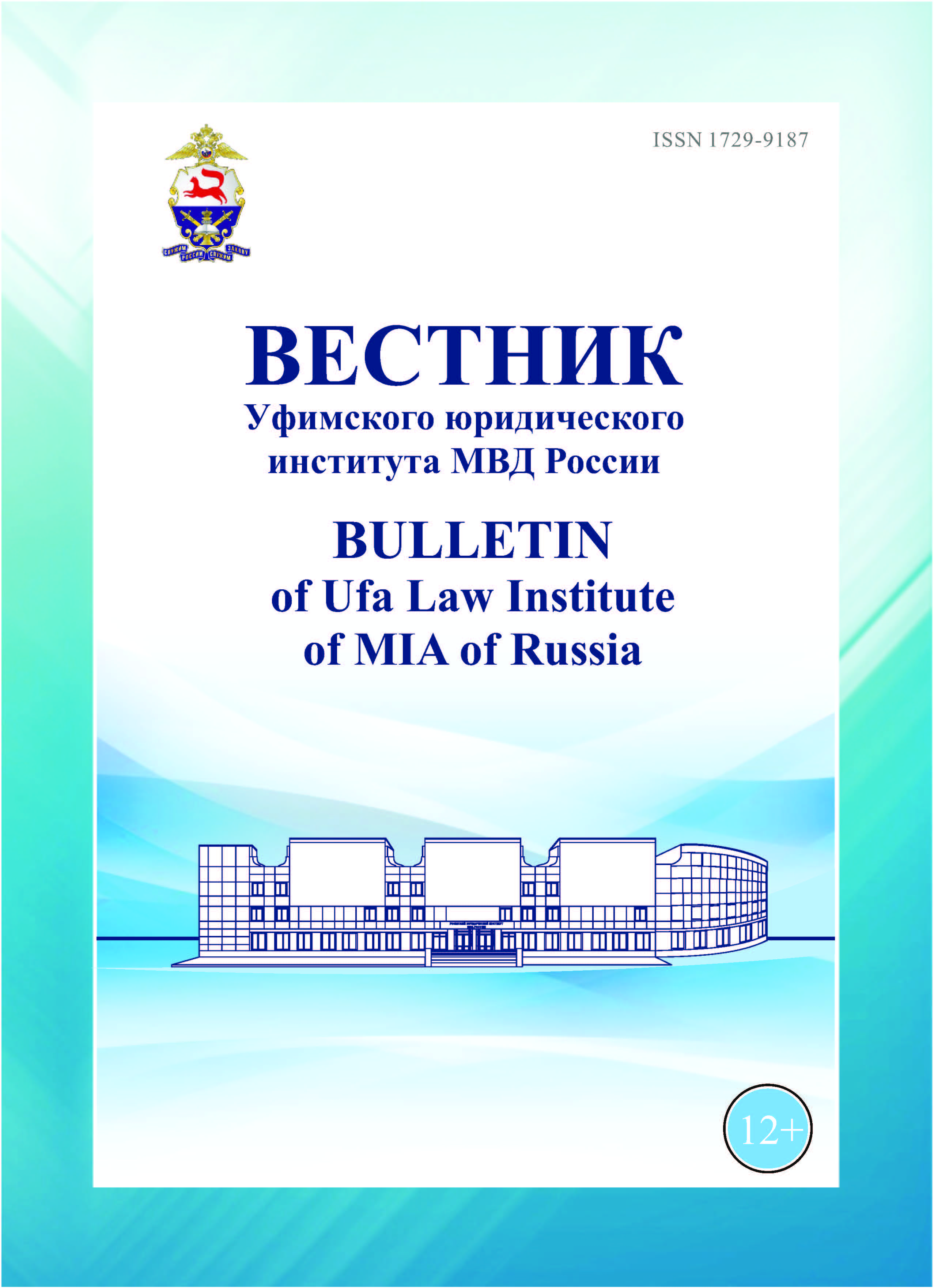from 01.01.2012 to 01.01.2024
Ural Law Institute of the Ministry of Internal Affairs of Russia (Department of Foreign Languages, Associate Professor)
from 01.01.2012 to 01.01.2024
Ural Law Institute of the Ministry of Internal Affairs of Russia (Department of Foreign Languages, Associate Professor)
from 01.01.2012 to 01.01.2024
Yekaterinburg, Ekaterinburg, Russian Federation
UDC 881/886
The article deals with the issues of formation of professionally oriented foreign language lexical competence using borrowed vocabulary of a terminological nature in the process of educational activities in the educational organization of the Ministry of Internal Affairs. The purpose of this article is the etymological analysis of foreign borrowings and the formation of a foreign language terminological vocabulary of the student as a system of concepts of the legal field of knowledge based on the developed exercises. This set of tasks is aimed at teaching law students to translate borrowed terminological units in the texts of legal discourse in practical classes on the discipline “Foreign language”, which serve as a means of forming foreign language communicative competence, ensure the development of search and creative skills of students. After analyzing the scientific methodological literature, the author formulates the functions and components of foreign borrowings of the terminological apparatus of the English legal discourse, describes the stages of its formation. In conclusion, it is noted that many examples of borrowings of a terminological nature are a specific feature of the English legal discourse. It is concluded that attracting the attention of students to this terminological group will contribute not only to the effective learning of lexical units in the preparation of professionally oriented texts on the target specialty, but also to the successful formation and development of their professional and general cultural competencies.
foreign borrowings, loanwords, legal discourse, legal system, terms, etymological analysis, language doublet, lexical units, professionally oriented text
1. Schane S. Language and the Law. London: Continuum. 2006. 228 p.
2. Northcott J. Language education for law professionals. In J. Gibbons & M.T. Turell (Ed.), Dimensions of Forensic Linguistics, 2008. P. 27–45.
3. Borovkova M. V. Lingvostylistic status of texts of legal interpretation and legal construction: Based on German-language and Russian-language texts: diss. ... Cand. of Philology. Yekaterinburg, 2001. 249 p. (In Russ.)
4. Dem’yankov V. Z. Study of text and discourse of mass media by methods of contrastive political linguistics // Language of mass media and politics / edited by G. Ya. Solganik. Moscow: Publishing House of Moscow University; Faculty of Journalism, Moscow State University named after M. V. Lomonosov, 2012. P. 77–120. (In Russ.)
5. Soboleva A. K. Canons of interpretation in law // Problems of legal technique: collection of articles. Nizhny Novgorod, 2000. P. 90–91. (In Russ.)
6. Popova L. E. Legal discourse as an object of interpretation. Semantic and pragmatic aspect: author’s abstract. dis. ... Cand. of Philology. Krasnodar, 2005. 22 p. (In Russ.)
7. Viehweg Th. Topics and law: a contribution to basic research in law. Frankfurt: Peter Lang, 1993. 176 p.
8. Shirinkina M. A. On some parameters of interpretative discourse in the sphere of law // jurislinguistics-10: lingvoconflictology and jurisprudence: interuniversity collection of 25 scientific papers / edited by N. D. Golev and T. V. Chernyshova. Kemerovo; Barnaul: Publishing House of Altai University, 2010. 452 p. (In Russ.)
9. Veretina-Chiriac, Ina. (2012). Characteristics and features of legal English vocabulary // Revistă Stiinţifică a Universităţii de Stat din Moldova. 4 (54). P. 103–107.
10. Tiersma P. M. Legal language. Chicago: Chicago University Press, 1999. 328 p.
11. Mellinkoff D. The Language of the law. Boston: Little Brown. 1963. 454 p.
12. Serjeantson M. A History of foreign words in English. London: Routledge & Kegan Paul, 1935. 354 p.
13. Mattila H. Comparative legal linguistics. Antony Rowe Ltd. Chippenham, Wiltshire. 2006. 364 p.
14. Richards J., Rodgers T. Approaches and methods in language teaching. Cambridge: Cambridge University Press. 2001. 270 p.
15. Richards J. C. Curriculum development in language teaching, Cambridge: Cambridge University Press. 2006. 336 p.
16. Kolarkova O. G., Savina A. A. Borrowings of legal terminology in the English language // Philological sciences. Theoretical and Practical Issues. 2017. No. 11 (77). Part 1. P. 109–111. (In Russ.)
17. Veretina-Chiriac, Ina. (2012). Characteristics and features of legal English vocabulary // Revistă Stiinţifică a Universităţii de Stat din Moldova. 4 (54). P.103–107.








